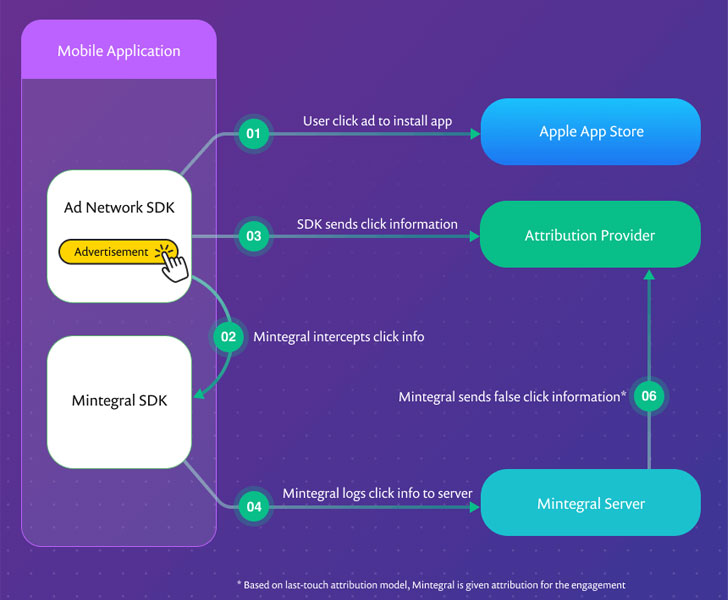BOOK THIS SPACE FOR AD
ARTICLE ADA popular iOS software development kit (SDK) used by over 1,200 apps—with a total of more than a billion mobile users—is said to contain malicious code with the goal of perpetrating mobile ad-click fraud and capturing sensitive information.
According to a report published by cybersecurity firm Snyk, Mintegral — a mobile programmatic advertising platform owned by Chinese mobile ad tech company Mobvista — includes an SDK component that allows it to collect URLs, device identifiers, IP Address, operating system version, and other user sensitive data from compromised apps to a remote logging server.
The malicious iOS SDK has been named "SourMint" by Snyk researchers.
"The malicious code can spy on user activity by logging URL-based requests made through the app," Snyk's Alyssa Miller said in a Monday analysis. "This activity is logged to a third-party server and could potentially include personally identifiable information (PII) and other sensitive information."
"Furthermore, the SDK fraudulently reports user clicks on ads, stealing potential revenue from competing ad networks and, in some cases, the developer/publisher of the application," Miller added.
Although the names of the compromised apps using the SDK have not been disclosed, the code was uncovered in the iOS version of the Mintegral SDK (6.3.5.0), with the first version of the malicious SDK dating back to July 17, 2019 (5.5.1). The Android version of the SDK, however, doesn't appear to be affected.
Hijack User Ad Clicks
Stating that the SDK contains several anti-debug protection intending to hide the actual behavior of the application, Snyk uncovered evidence that Mintegral SDK not only intercepts all the ad clicks within an app but also use this information to fraudulently attribute the click to its ad network even in cases where a competing ad network has served the ad.
It's worth noting that apps that feature in-app ads include SDKs from multiple ad networks with ad mediators' help.
"When the attribution provider attempts to match the install event to registered click notifications, it finds two that match," the analysis found. "Using a last-touch attribution model, the Mintegral click notification is given the attribution and the click notification from the other ad network is rejected."
In other words, Mintegral has been stealing ad revenues from other advertising networks by claiming the ads from a different ad network as its own, in addition to robbing developers off their revenues even when the platform isn't being used to serve ads.
"In our investigation, we discovered that once the Mintegral SDK is integrated into an application, it intercepts the clicks even if Mintegral isn't enabled to serve ads," Miller said. "In this case, ad revenue that should have come back to the developer or publisher via a competing ad network will never be paid to the developer."
Collecting More Data Than Necessary for Ad Click Attribution
Even more concerningly, the SDK contains functions that are designed to snoop on all communication from the impacted apps, with the scope of data being collected far more than what's required for legitimate click attribution.
The information logged includes OS Version, IP Address, charging state, Mintegral SDK version, network type, model, package name, advertising identifier (IDFA or Identifier for Advertisers), and more.
"The attempts by Mintegral to conceal the nature of the data being captured, both through anti-tampering controls and a custom proprietary encoding technique, are reminiscent of similar functionality reported by researchers that analyzed the TikTok app," Miller noted.
While there's no way to know for users to know if they're using an app that embeds the Mintegral SDK, it's imperative that third-party developers review their apps and remove the SDK to plug the data leak.
For its part, Apple is introducing new privacy features in its upcoming iOS 14 update that makes it harder for third-party apps to track users by asking for their explicit consent for serving targeted ads.
Found this article interesting? Follow THN on Facebook, Twitter and LinkedIn to read more exclusive content we post.
.png)
 4 years ago
156
4 years ago
156 

















 Bengali (Bangladesh) ·
Bengali (Bangladesh) ·  English (United States) ·
English (United States) ·